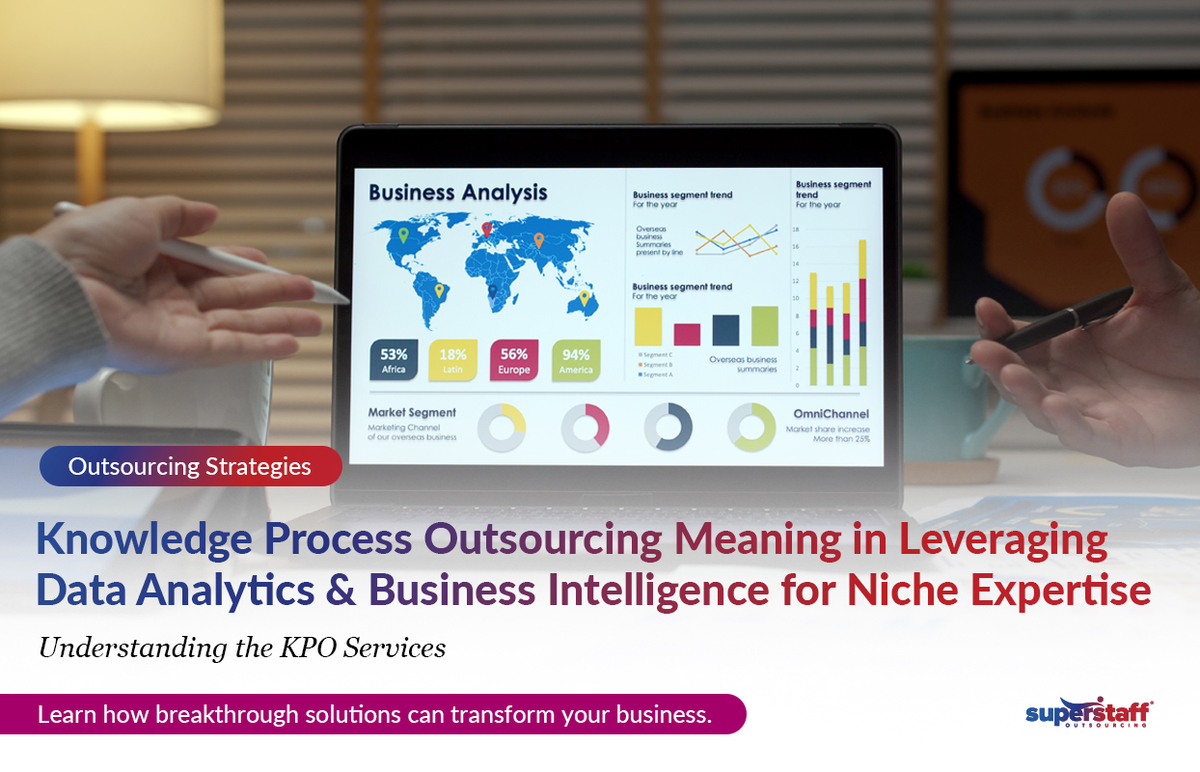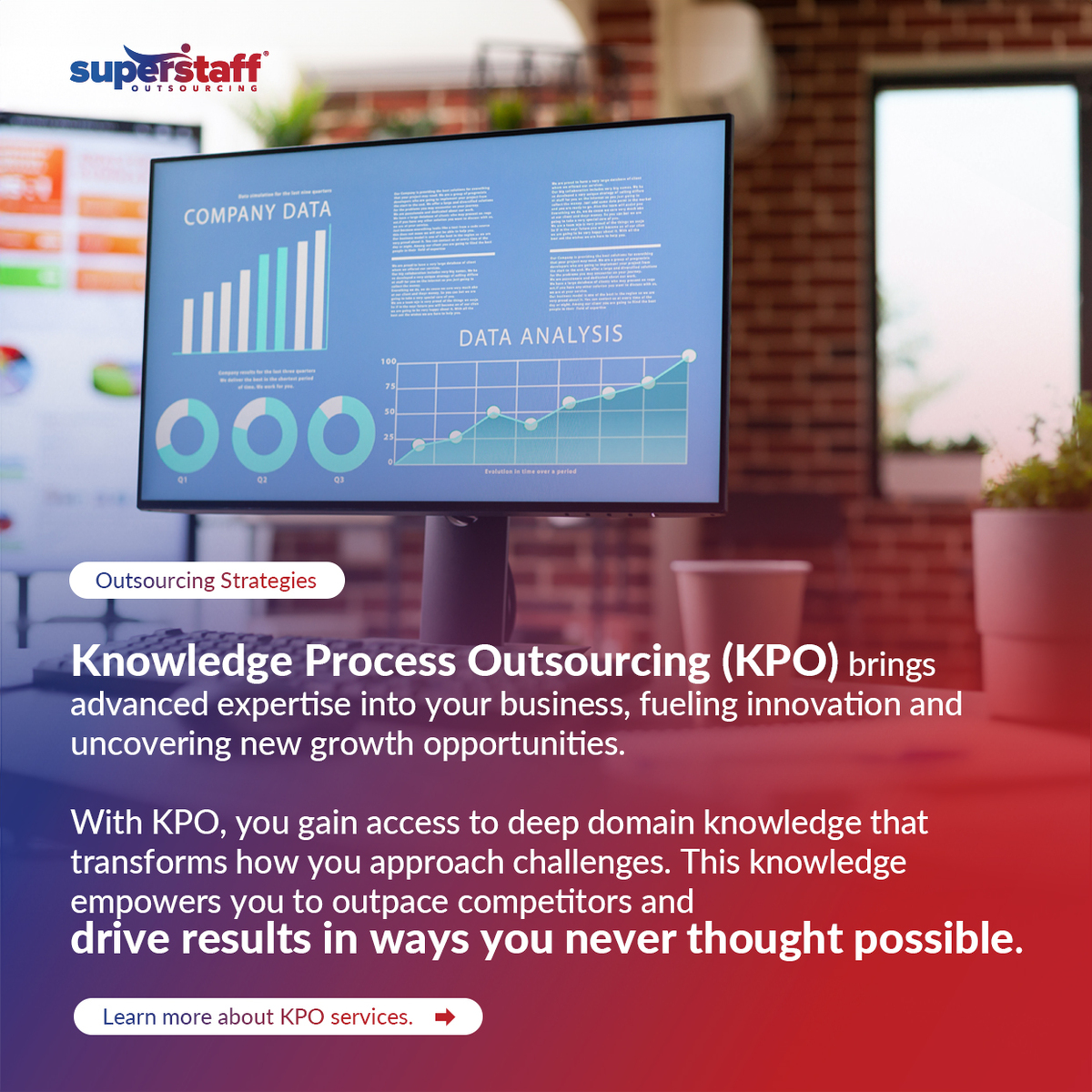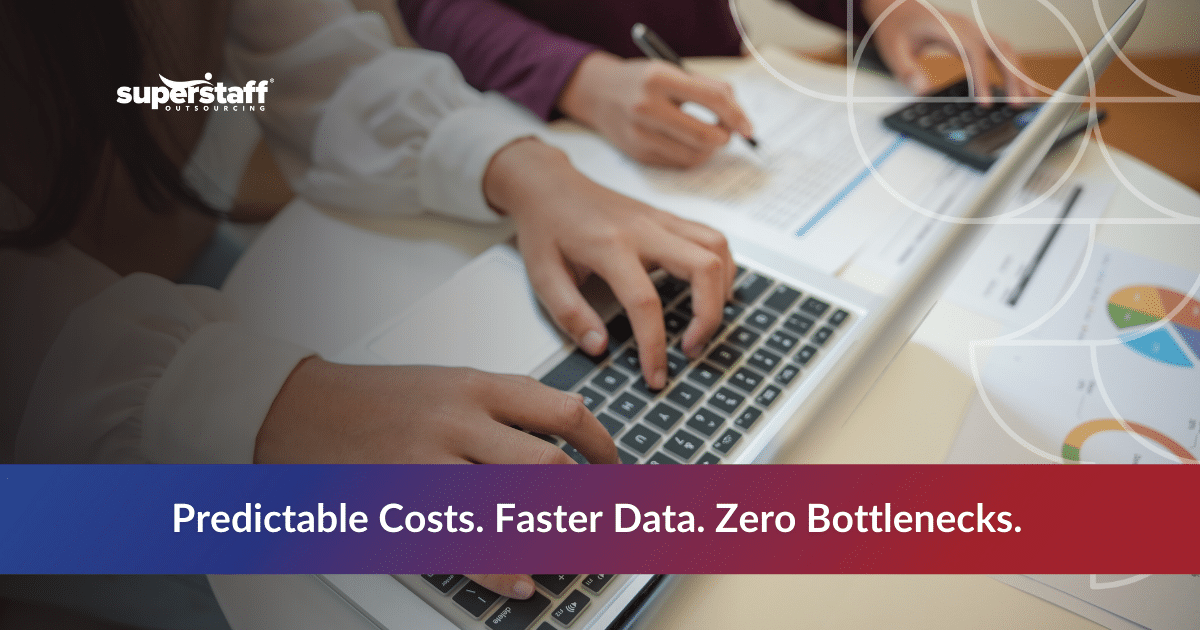
In today’s hyper-competitive business landscape, the real advantage lies not just in having data, but in knowing how to use it. As data continues to shape the future of business, forward-thinking leaders like you understand that harnessing its full potential is essential for staying ahead. This is where Knowledge Process Outsourcing (KPO) becomes a game-changer.
By outsourcing specialized tasks such as data analytics and business intelligence (BI) to experts, you gain more than just operational efficiency, you unlock critical insights that drive smarter, faster decision-making. In this article, we’ll dive into how KPO can transform raw data into actionable strategies, fueling sustainable growth and positioning your business for long-term success.
Understanding the Knowledge Process Outsourcing Meaning
Knowledge Process Outsourcing (KPO) is more than a cost-saving measure; it’s about entrusting high-value, specialized work to expert outsourcing providers. To fully understand its impact, it’s essential to explore its definition and compare it to traditional Business Process Outsourcing (BPO).
What Is Knowledge Process Outsourcing?

KPO involves outsourcing complex, knowledge-intensive functions such as research and development, legal support for law firms, and data analytics fall under KPO. Businesses turn to KPO when they require expertise that only highly skilled professionals can provide.
The global KPO market is projected to reach $88.12 billion by 2031, with a compound annual growth rate of 16%. This growth underscores the increasing demand for businesses to leverage specialized skills and expertise to gain a competitive edge.
Beyond Cost Savings
While cost savings are a core benefit of KPO, the true advantage lies in accessing niche expertise without the overhead of training or expanding in-house teams. Outsourcing these specialized tasks lets your business focus on its core operations while ensuring that complex functions are handled efficiently. The result? Improved operational efficiency and stronger business performance driven by expert knowledge.
Comparing the Differences Between KPO and Traditional Business Process Outsourcing (BPO)
Now that we’ve defined Knowledge Process Outsourcing (KPO), it’s important to distinguish it from Business Process Outsourcing (BPO). While both serve as key outsourcing strategies, they differ significantly in their scope and focus.
Understanding BPO
BPO involves delegating non-core business tasks to an external provider. Common examples include customer service, back-office functions like accounting, bookkeeping, data entry, and virtual assistant services. BPO aims to streamline routine tasks that are necessary but not central to your company’s value proposition.
Contrary to outdated perceptions, outsourcing today extends far beyond call centers. It has evolved into a sophisticated approach for outsourcing high-quality, expertise-driven tasks to third-party providers. This evolution is where KPO takes shape as a specialized subset of BPO.
Key Differences Between KPO and BPO
BPO primarily focuses on repetitive, standardized tasks, while KPO handles more complex and knowledge-intensive work. KPO involves tasks that require industry expertise, such as data analytics and business intelligence, which help drive informed decision-making and improve overall business strategy.
As we delve deeper into KPO, its focus on data analytics and business intelligence becomes clear. This emphasis on specialized knowledge and high-level insights sets it apart from BPO, which is more process-driven.
In the following sections, we’ll further explore the strategic advantages KPO offers, particularly in data-centric industries.
The Role of Data Analytics in KPO
Data analytics is the backbone of Knowledge Process Outsourcing (KPO). It transforms raw data into actionable insights, enabling businesses to make more strategic decisions. Let’s explore how data analytics enhances the value of KPO and supports your outsourcing goals.
The Importance of Data-Driven Decision-Making

Data can enhance key aspects of your business, from decision-making to overall operations. Data-driven organizations are three times more likely to excel in making informed business decisions. Yet, despite this, 62% of executives still rely primarily on their own experience when making decisions.
While your experience as a business leader offers valuable perspective, data analytics brings objectivity and clarity. It provides factual, unbiased insights, helping you refine your strategies and propel your business forward.
Types of Data Analytics in KPO
KPO relies heavily on three types of data analytics: descriptive, predictive, and prescriptive.
- Descriptive Analytics: This approach uses historical and current data to identify trends and patterns. It helps businesses understand what has happened and analyze real-time information for ongoing insights.
- Predictive Analytics: Predictive analytics forecasts future outcomes based on past data. Powered by machine learning and artificial intelligence, it allows businesses to anticipate trends and make more informed decisions about what lies ahead.
- Prescriptive Analytics: This type of analytics provides actionable recommendations based on data insights. While these suggestions are valuable, they should complement—rather than replace—your experience as a leader. Use them as a guide to inform your next steps.
Data analytics, when integrated into KPO, offers more than just information; it provides a roadmap for success, aligning your decisions with market trends and future opportunities.
How KPO Providers Use Data Analytics To Enhance Business Efficiency
KPO providers employ teams of data scientists, analysts, and experts who specialize in leveraging data analytics to deliver actionable insights. These professionals are well-versed in the latest data analytics tools and techniques, with proven experience in data science. Their expertise enables them to transform raw data into clear, objective insights that drive more informed decision-making, enhance productivity, and streamline workflows.
Tools and Software Driving Data Analytics in Outsourced Processes
Several powerful tools enable KPO providers to execute data analytics efficiently. Among the most notable are Microsoft Excel, Power BI, Google Analytics, and RapidMiner.
- Microsoft Excel: Known for its accessibility, Excel remains a widely used tool for basic data analysis. It allows users to create spreadsheets, apply formulas, and develop visualizations such as graphs and charts to make data more comprehensible.
- Power BI (Power Business Intelligence): This advanced tool takes data analysis further by generating complex data models and insightful visualizations, offering substantial data-driven insights that support strategic decision-making.
- Google Analytics: Primarily focused on user and customer behavior, Google Analytics is an essential tool for analyzing web traffic and user interactions. It is highly effective, with one director reporting a 50% reduction in reporting time thanks to this tool.
- RapidMiner: Specializing in data mining, RapidMiner is designed to create efficient data models and support predictive analytics.
The Role of Data Analytics in KPO Strategy
Data analytics plays a pivotal role in KPO, offering valuable insights that empower businesses to make strategic decisions in real-time. By integrating business intelligence (BI) tools, KPO providers enable businesses to respond quickly to market changes and operational demands.
Let’s explore how KPO, combined with BI, can further enhance your decision-making capabilities.
Business Intelligence as a Game-Changer in KPO
Business intelligence (BI) enhances Knowledge Process Outsourcing (KPO) by converting raw data into actionable insights that drive strategic decisions. Let’s explore how BI strengthens your business operations and decision-making.
Overview of BI Systems and Their Significance in Decision-Making
Business intelligence is a powerful tool that transforms raw business data into unbiased, data-driven insights. These insights are derived from customer behavior, purchase history, market trends, and other relevant datasets. The goal is to organize overwhelming amounts of raw data into clear, error-free insights, enabling your business to make informed, intelligent decisions.
Integrating BI Tools in KPO for Real-Time Forecasting
BI tools offer significant advantages, particularly in real-time forecasting. By integrating BI systems, KPO providers can uncover trends and patterns within your business and industry. This allows data analysts to deliver insights on both current and future market trends, enabling you to adjust operations and maintain consistency. The ability to act on real-time data ensures that your business stays agile and responsive to market shifts.
The Role of BI in Enhancing Customer Experience and Operational Agility
Like Google Analytics, BI enables you to analyze customer behavior, purchasing habits, and overall customer experience. By extracting insights from these datasets, BI helps identify areas for improvement and highlights practices that enhance customer satisfaction. The primary objective of BI is to improve both customer experience and operational performance by providing actionable insights that drive continuous improvement.

Challenges and Best Practices for Leveraging Data Analytics and BI into KPO
Data analytics and business intelligence (BI) offer significant benefits, but they also present certain challenges that businesses must address to fully realize their potential.
Common Challenges in Implementing Data Analytics and BI
- Data Privacy: The access granted by data analytics opens potential vulnerabilities. It is critical to implement robust security measures to control who can access sensitive information. Moreover, teams from different departments should only access data that they are authorized to handle, ensuring both internal and external data protection. This practice not only safeguards your business but also ensures compliance with data privacy regulations.
- Integration Complexities: Implementing data analytics and BI is rarely a one-time process. It often involves navigating unfamiliar technology and software, which can lead to inefficiencies if not properly managed. Successful integration requires a deep understanding of both the tools and the business needs, or it can result in counterproductive efforts.
- Talent Shortages: The demand for skilled data scientists and analysts is rapidly growing. The U.S. Bureau of Labor Statistics predicts a 36% increase in demand for data scientists by 2033. Finding and retaining qualified talent for such complex implementations can be a significant challenge.
While these challenges are real, outsourcing data analytics and BI functions can effectively mitigate them. Outsourcing providers often maintain stringent data security measures, ensure professional integration, and have access to a pool of specialized talent, all without the significant costs associated with building an in-house team.
Addressing Data Privacy Concerns in Outsourcing Arrangements
Outsourcing data analytics and BI requires strict adherence to data privacy policies and regulations. As data flows between your organization and the outsourcing provider, it is essential to conduct thorough risk assessments to identify and address any gaps in your data security. Additionally, ensure that your outsourcing partner complies with major data protection regulations, such as GDPR, HIPAA, or CCPA, and holds the necessary certifications to guarantee compliance and safeguard your business’s data integrity.
Outsourcing these functions not only alleviates the complexity of implementation but also ensures that your data is secure and your business intelligence is optimized.
Best Practices for Aligning KPO Collaboration With Your Business Goals
#1: Identify Your Goals for Your KPO Team
Before starting your outsourcing journey, clearly define your objectives. Determine which areas of your business require outsourcing and what outcomes you want to achieve. Identifying these goals will help you find a KPO provider that aligns with your specific needs and objectives.
#2: Choose the Right Provider and Assess Their Track Record
When selecting a KPO provider, treat it like commissioning a strategic partner. Review their experience, portfolio, and track record to ensure they have the expertise necessary for your industry. A thorough background check is critical in confirming their ability to meet your business needs and deliver the desired results.
#3: Evaluate Your KPO Provider’s Technological Capabilities
Data analytics and business intelligence rely on advanced technologies. Your KPO provider should be proficient in the latest tools, such as artificial intelligence, automation, data mining, and machine learning. Ensure their technological capabilities align with your standards, enabling a more efficient and forward-thinking outsourcing experience.
#4: Ensure Your KPO Provider Adheres to Strict Cybersecurity Policies
As your KPO provider gains access to sensitive data, cybersecurity becomes essential. Your provider must follow strict cybersecurity policies and regulatory guidelines to protect your business and client information. Teaming up with a provider that prioritizes data security will mitigate the risks associated with data breaches.
#5: Monitor Your KPO Operations
Ongoing performance monitoring is key to a successful KPO partnership. Use key performance indicators (KPIs) to measure your provider’s performance and ensure alignment with your goals. Continuous monitoring allows you to identify areas for improvement and encourage your provider to maintain their strengths.
Continuous Training and Staying Ahead of Technological Advancements
Data analytics and BI are constantly evolving, driven by advancements in AI, automation, and machine learning. To maintain efficiency and stay competitive, it’s crucial for both your organization and your KPO provider to stay updated on the latest technologies. Continuous training is essential to sustaining high performance and ensuring your partnership adapts to technological changes.
By understanding these best practices and addressing potential challenges, you can unlock the full potential of your KPO experience and drive meaningful business growth.
Stay Ahead of the Curve With An Outstanding KPO Provider
To recap, what is knowledge process outsourcing (KPO)? It involves delegating specialized functions to an outsourcing provider, entrusting critical tasks to experts in your field. KPO becomes a powerful strategy when combined with data analytics and business intelligence (BI). The goal is to drive sustainable growth and maintain a competitive edge. Data analytics generate actionable insights, while BI enhances your decision-making processes, leading to more informed and strategic outcomes.
Ready to leverage the advantages of KPO for your business? Consider partnering with SuperStaff. Our experienced team is dedicated to driving your business forward by delivering expertise and deep industry knowledge. Collaborate with SuperStaff today and propel your business to new heights.






